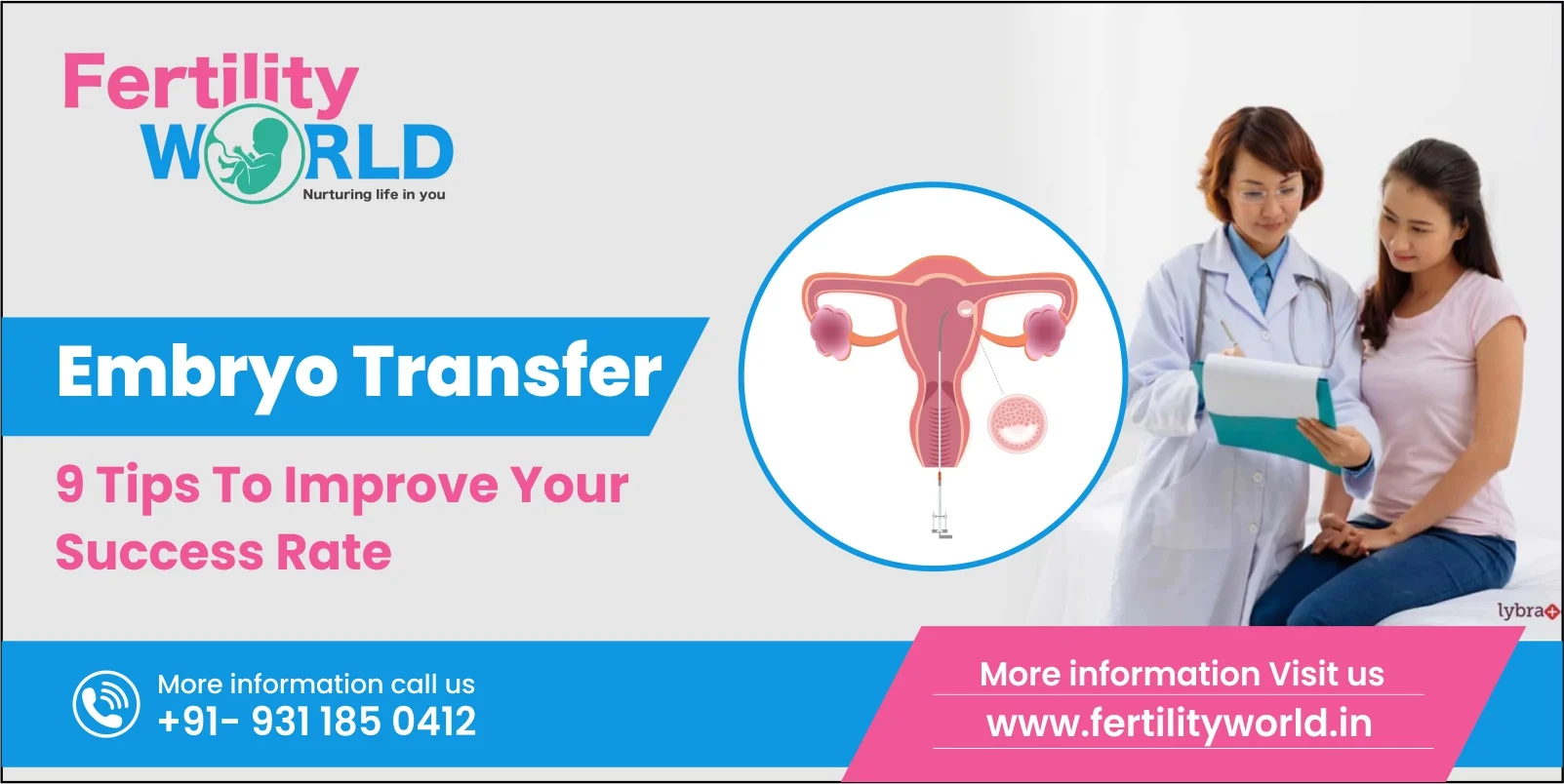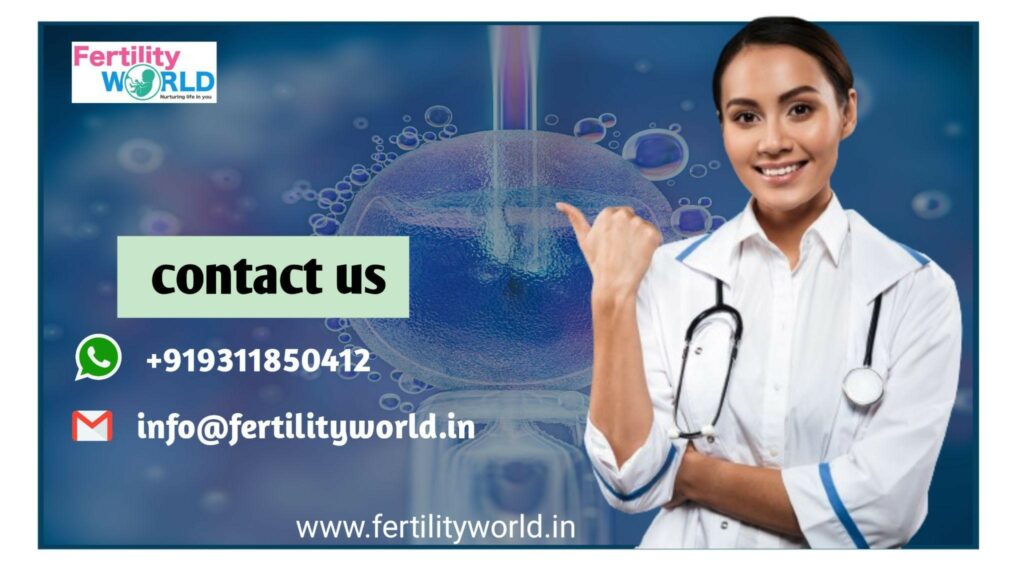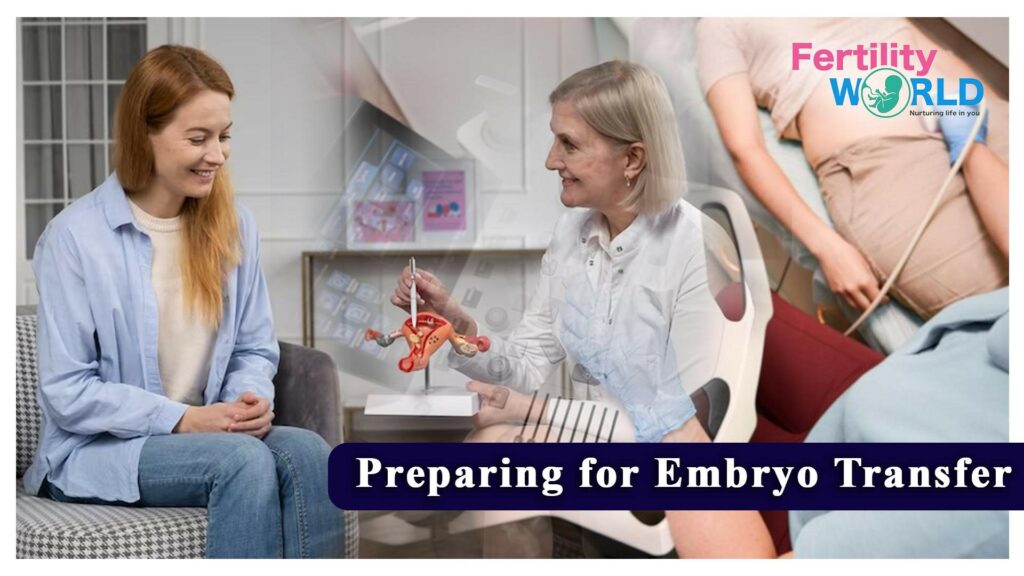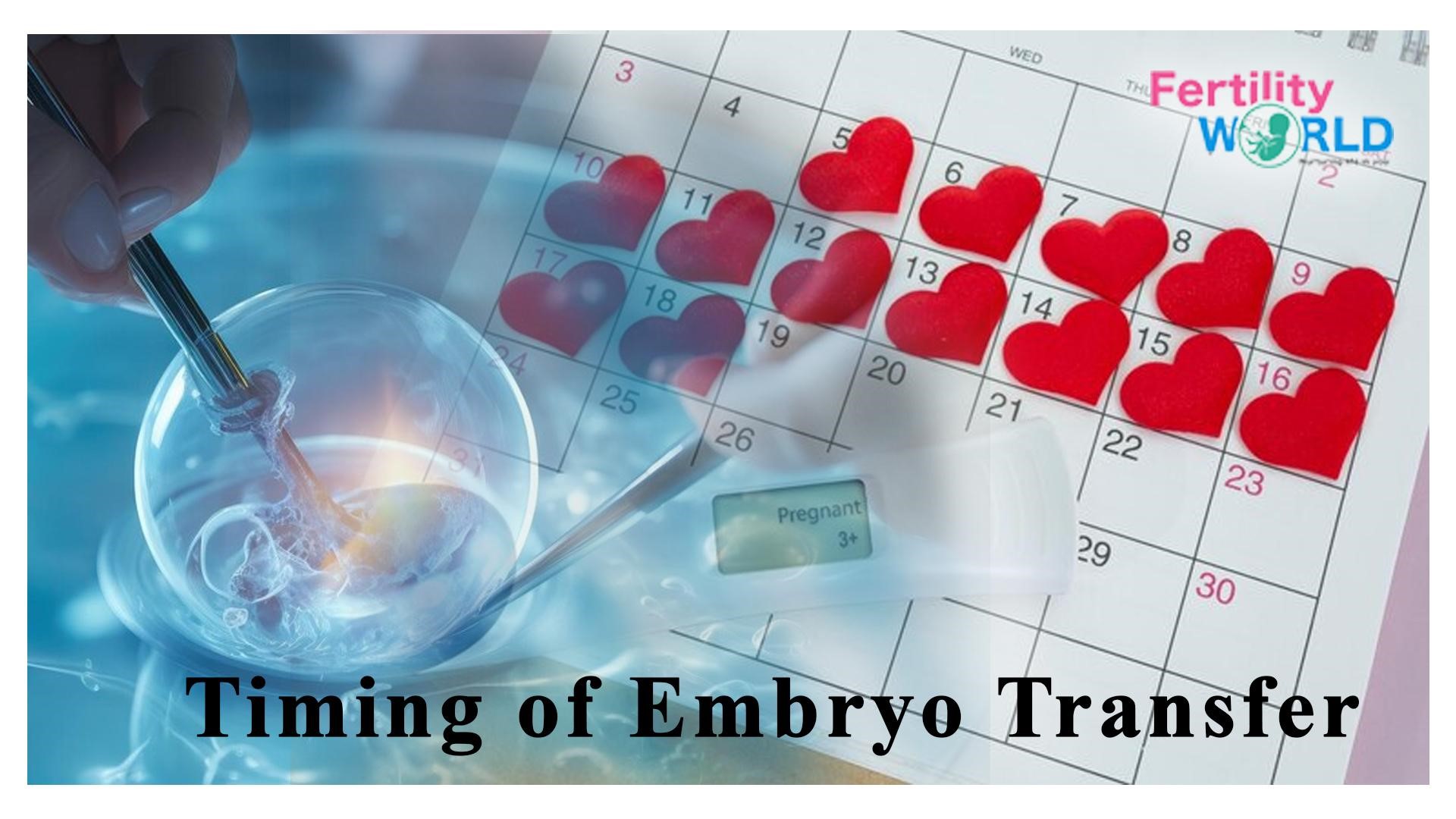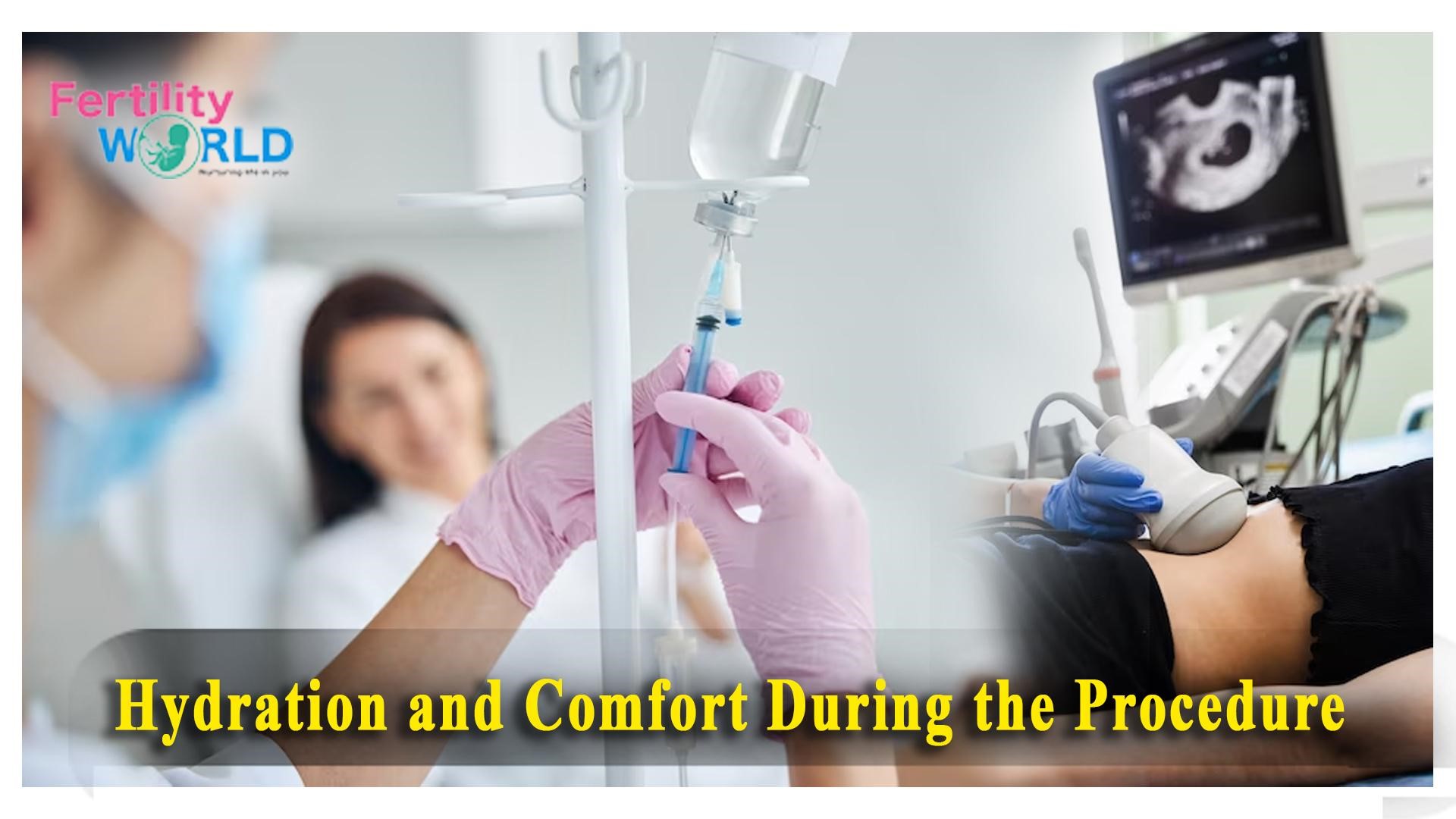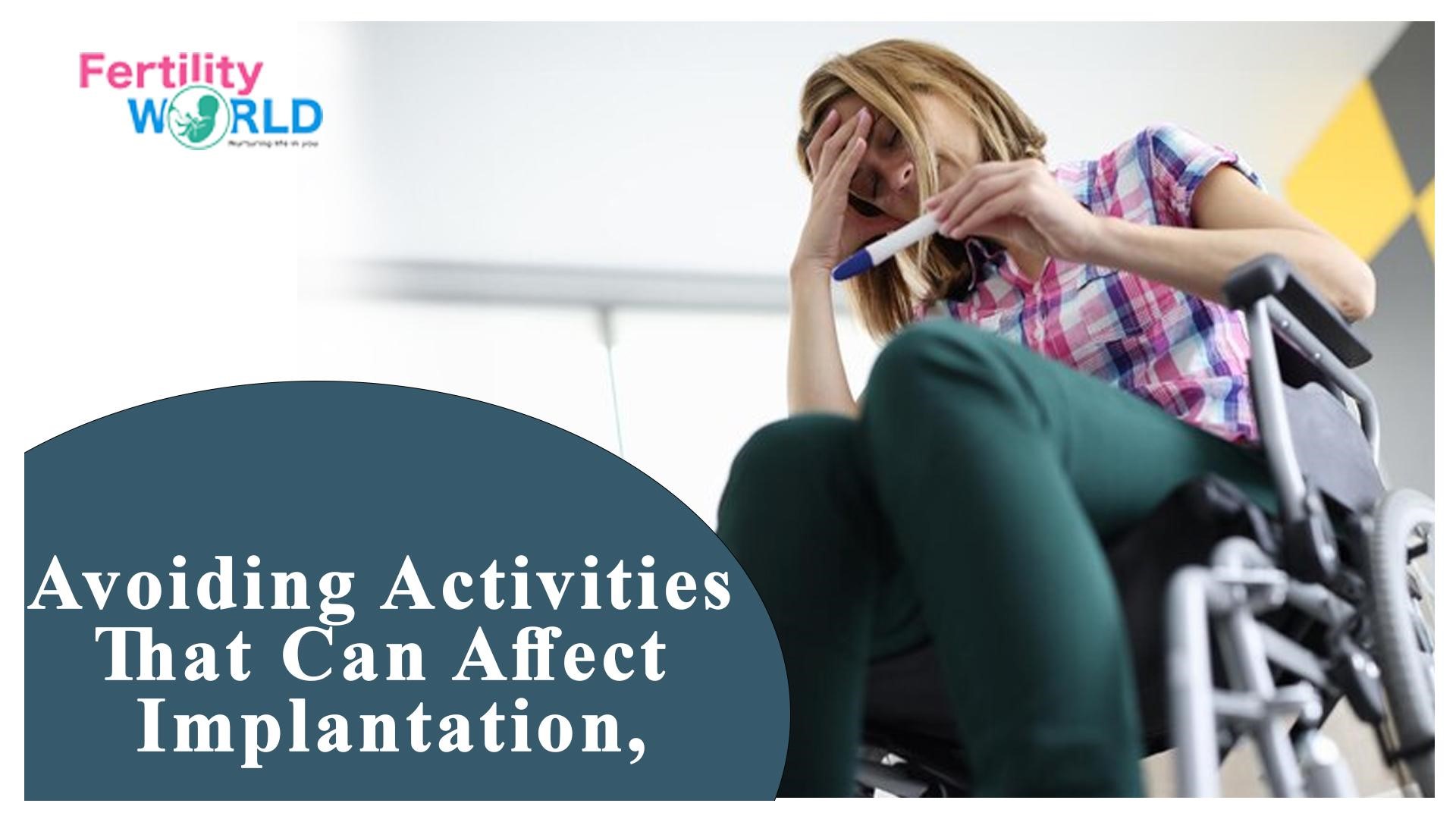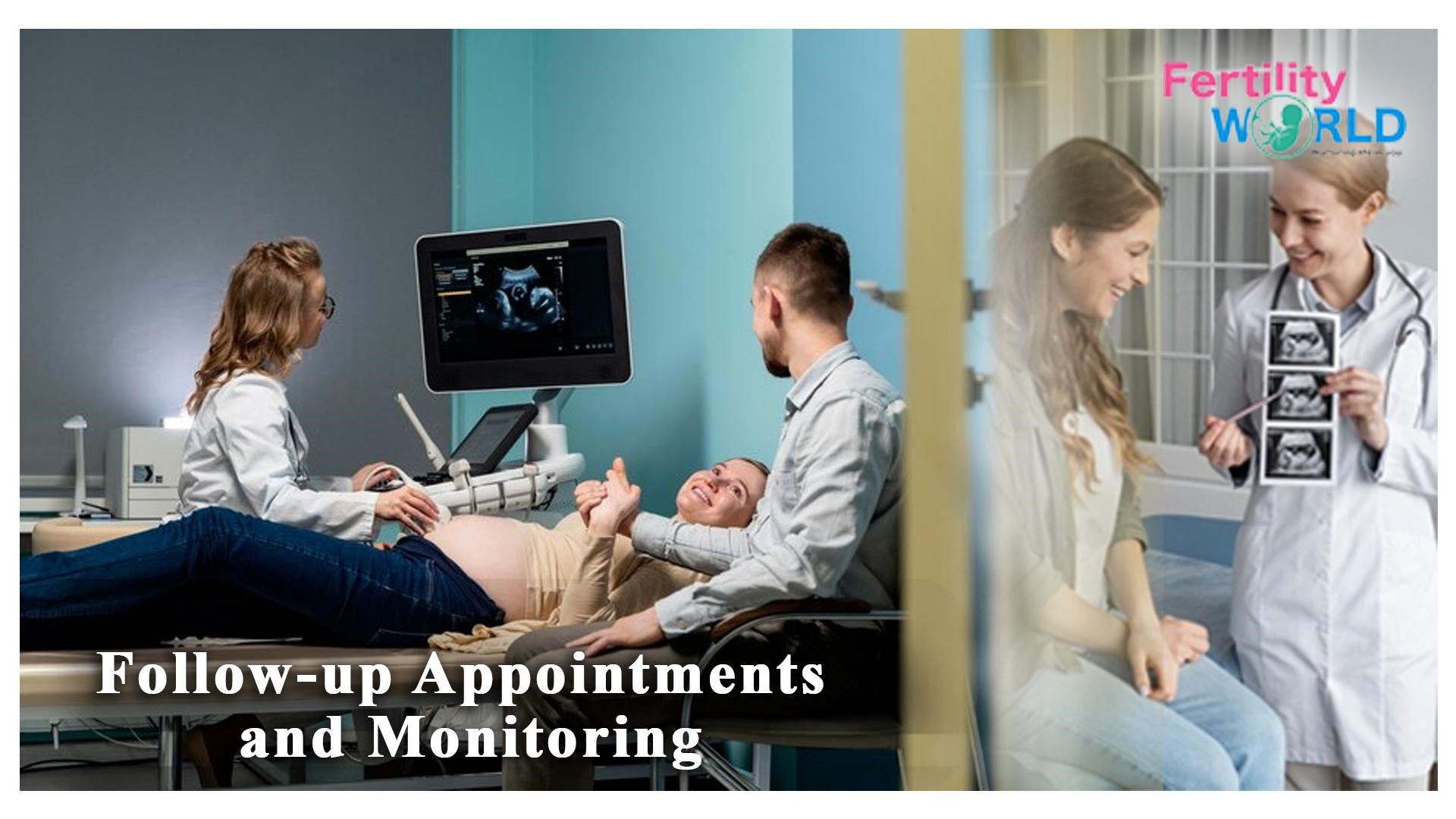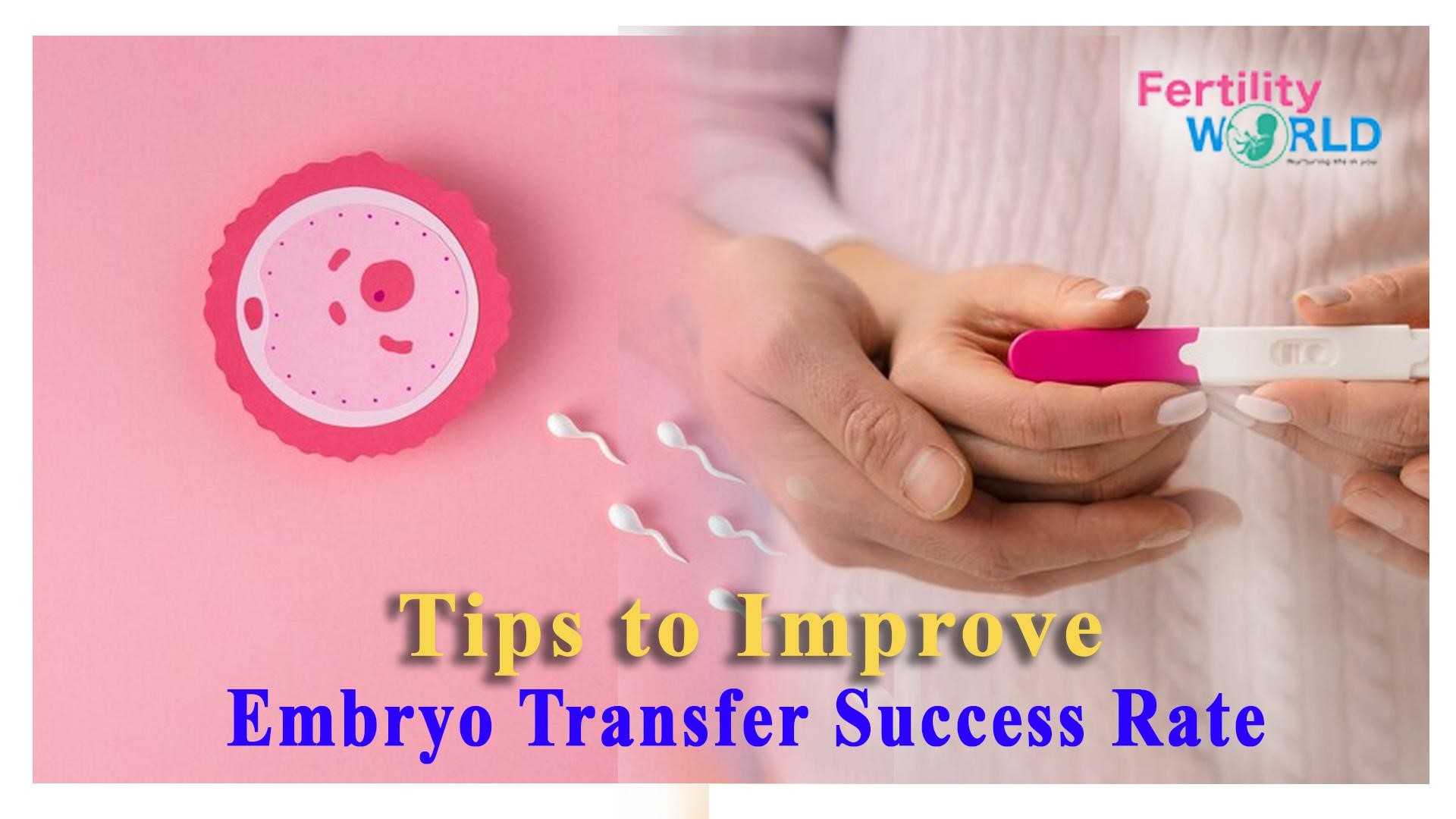In the In-vitro fertilization (IVF) treatment procedure, the embryo transfer step is the most crucial and most anticipated by both the parents and the performing experts in the hope of achieving a success rate. This step is significant as the experts use a grading tool to determine which embryos to transfer and when, mostly one has to be transferred to limit the number of multiple births.
During the embryo transfer procedure/IVF Implantation Process in India, gynecologist entrusts their experiences & skills to place the embryo within the uterus using a thin catheter containing the agreed-upon number of embryos, along with a small amount of fluid, which is passed through the cervix into the uterus, where the embryo or embryos are released. Sometimes, an intending parent’s healthcare carelessness may result in the waste of embryos and lead to repeating the transfer.
The Fertilityworld highly qualified teams suggest the best tips to improve your IVF success rate during the embryo transfer.
- Book an appointment: Get an IUI free consultation
Preparing for Embryo Transfer
Embryo transfer succeeds when an embryo gets attached to the wall of the uterus in the endometrial lining. In IVF, this step begins within 6-10 days after the egg retrieval & fertilization process. However, the rate at which embryos successfully implant depends upon the quality of the embryo and the receptiveness of the uterus. The failure of implantation is due to chromosomal abnormalities in the embryo, which explains why implantation rates go down as a woman ages, and using donor eggs can help overcome this problem in many cases. If a patient suffers from poor egg quality, the resulting embryos may not be healthy enough to implant.
The issues in the fallopian tubes, if any should be fixed before the embryo transfer can happen. If the woman undergoing IVF uses her eggs, hormone profiling (FSH, AMH, etc.) is a must, along with a transvaginal scan of your reproductive organs. For the male partner, semen analysis is suggested.
Therefore, it is always crucial for both partners to follow various activities such as
- Follow a healthy lifestyle and avoid unhealthy ones.
- Avoid consuming caffeine-containing products including vegetables.
- Avoid drinking alcohol.
- Food to eat: Fresh fruits, vegetables, fish, chicken, whole grains, avocados. These foods provide the nutrition and support your body for a potential pregnancy.
- Women must follow moderate exercise,
- Strictly avoid processed food items & packaged food such as smoothies, red meat products, tea, coffee, and sugar,
- Consider acupuncture therapy on your embryo transfer day.
9 Tips to Improve Embryo Transfer Success Rate
The IVF success rate in India is excellent which is between 75% to 85% because of the best tips suggested by experts to improve embryo transfer success rates in activities involving medically, physically, and mentally. The most significant step during the IVF procedure leading to its high success is because of the embryo transfer step, when the transfer is successful and the embryo gets aligned in the uterus the success rate of IVF pregnancy is guaranteed. Here we have provided the most common 9 tips for embryo transfer success rates:
- Choose the right fertility centre: With the increasing demand for IVF, there are many emerging fertility centres but selecting the right one can realize your parenthood dreams. The fertilityworld is the best clinic for IVF in India, it has received the highest awards contributing hugely to parenthood through IVF treatment. Every year, it seeds records of delivering more than 1000 healthy children to the most intending parents and couples.
- Select the best IVF Doctor: The IVF procedure, especially during the embryo transfer step requires experienced, multi-skilled fertility experts. You can find many fertility Doctors online but having a thorough discussion during a free consultation provided by the centre can determine your doctor’s expertise. The best IVF Doctors in India can be found at the fertilityworld.
- Avoid stress: Stress is a damaging factor to all systems in the human body and a very sensitive to the reproductive system. In embryo transfer, it can cause the body to tighten up, leading to insufficient blood flow. Maintaining a stress-free environment can result in many positive outcomes & improved uterine receptivity. Exploring relaxation techniques such as yoga, meditation, deep breathing exercises, positive thinking, Tai Chi, and moderate exercise are excellent options to reduce stress levels.
- Follow an efficient diet: An efficient diet rich in nutrients such as protein, vitamin C, and iron can improve blood flow to the uterus. Follow the best diet suggested by the fertility dietician to aid implantation. Avoid foods like high-mercury fish and soft cheeses, and check with your doctor about any vitamins or supplements you should be taking. Of course, avoid all harmful substances such as alcohol, nicotine, and caffeine.
- Maintain a healthy body mass index (BMI): Too high (obese) or low BMI (underweight) has an impact on endometrial receptivity reducing embryo transfer success rate. Maintaining a BMI between 19-35 is most excellent to improve the embryo transfer success rate.
- Consider Acupuncture: Acupuncture helps to improve blood flow to the lining, reduces contractility of the uterus, and reduces the stress response. It also helps in optimizing and balancing the levels of estrogen and progesterone. As a result of these hormone levels being balanced correctly, the lining of the uterus can develop properly – a thick, well-nourished lining that is ideal for implantation.
- Take it easy after embryo transfer: Negative overthinking including anger, fear, shame, and other unpleasant emotions causes unrest to the body and mind that can disrupt the embryo division after embryo transfer. Always be vigilant in maintaining positive outcomes and try to think about how to raise your child and plan for his/her future, this is the most significant tips to enhance your embryo transfer success rate.
- Pamper yourself for a couple of days: After the transfer, the hope is that the embryo will be implanted. It takes a couple of days, so give yourself a few days to relax and rest. Some experts will suggest that you take some time off if you can, and some might even gently suggest that you skip the vigorous workout and stay for a positive outcome.
- Take the right supplements: Taking the right supplements is important – too much, too little, or the wrong nutraceutical can impact your success. However, before you decide to undergo any natural supplements always consider your healthcare provider’s suggestions and advice, they know the best supplement that will favour your immunity and support to embryo transfer success rate.
Optimizing Uterine Receptivity
The endometrium, or lining of the uterus, is where the embryo implants early in a pregnancy. For improving embryo transfer, the ideal endometrium(uterine) should be relatively thick with a layered appearance and this uterine receptivity can be affected by many factors including hormonal disorders, thyroid disorders, autoimmune disorders, and due to anatomical problems involving the shape or positioning of the uterus, or trouble with the endometrial lining.
Therefore, to diagnose uterine receptivity a thorough diagnostic procedure such as endometrial biopsy, transvaginal ultrasound imaging (TVUS), endometrial receptivity array (ERA), and ReceptivaDx test (BCL6) are done, or medication like dexamethasone is prescribed before embryo transfer.
Generally, being too concerned about implantation causes unnecessary stress at a time when you should be doing your best to relax. Here are some important tips you can take as you prepare for your transfer and after the procedure to give yourself the best possibility of success:
- Boost blood flow: Moving the body is the simplest way to get the blood flowing. Maintaining moderate-intensity exercise for 20 minutes a day or a simple walk or yoga flow is enough to help with circulation.
- Follow a supplement diet: Low estrogen levels cause thin endometrial lining. Black cohosh, chaste berry, red clover, royal jelly, etc are the best supplements. However, always inform the expert before starting any new supplement for the best guide. Naturally, estrogen-content food includes soybeans, peaches, flax seeds, garlic, and sesame seeds.
Timing of Embryo Transfer
The timing of embryo transfer is very critical to triggering the success of implantation, there will be a complex cross-talk between the endometrium & the blastocyst, with the endometrium only being receptive to implantation during a transient window of implantation of 2–3 days during the mid secretory phase. Usually, embryo transfer is done on the 3rd or 5th day after fertilization usually considered as the cleavage stage i.e. 3rd day after co-incubation, or the blastocyst stage i.e. 5th day after co-incubation. There is a significant difference between these two stages of maturation as the embryos grow rapidly. Each embryo starts as a single cell and divides every 12 to 24 hours, on day 3 growth, it becomes 4 and 8 cells and 70 and 100 cells on day 5. 5th day of growth, the embryo is called a blastocyst and consists of two types of cells, one will develop into fetal tissues, and the other will develop into the placenta.
The time of embryo development stage, quality, as well as endometrial receptivity, are key determinants to successful transfer. The embryos must be placed into the uterus at a time in which the endometrium is optimized to facilitate embryo transfer success rate.
Although embryos consist of just 4 to 8 cells on day 3, doctors are often able to distinguish between the available embryos and choose those that would be most suitable for a transfer procedure. If we can distinguish which embryos are the most ideal, it is beneficial to perform the transfer on day 3. The uterine environment may encourage cell growth, making it more likely that the embryo will reach the blastocyst stage of development and implant itself into the uterine wall.
Hydration and Comfort During the Procedure
It’s important to stay hydrated and comfortable during the embryo transfer procedure, especially in this early IVF embryo transfer process. Embryo transfers also require a full bladder, which helps to maintain the uterus in an optimal position to receive the embryo. Also, without adequate water intake, cervical mucus is more likely to be dry, making conception more difficult. It will boost your immune system during IVF treatment.
To stay hydrated and comfortable during the embryo transfer procedure, follow these tips:
- Take progesterone: Progesterone prepares your uterine lining for a pregnancy. Progesterone creates an optimal environment for the implantation of embryos.
- Drinking at least two liters of water a day, and other liquids in your diet (excluding alcohol, caffeine, and intoxicated contents) is always recommended.
- Maintain your body temperature that’s comfortable and soothing.
- Don’t hesitate to take your prescribed medications.
- Eat a healthy diet, healthy fats, lean protein, fresh fruits and vegetables, etc.
- Start taking a daily folic acid supplement.
- Pay attention to endocrine-disrupting chemicals.
Post-embryo transfer care
To support the embryo’s implantation after the embryo transfer. There are various healthy support tips that patients have to follow including:
- Stay relaxed: The “two-week wait” between transfer and official pregnancy test. Get a good time to sleep, have positive thoughts, take a day off, cuddle up on the couch, and watch Netflix, or go for a quiet walk somewhere soothing. In these ways, you can maintain your relaxed environment.
- Maintain vigorous exercise: Keep your body and health in a good and healthy state by simply following a moderate 20-minute exercise a day, meditating, doing fertility yoga, and following fertility diet plans. Your ovaries are likely to still be enlarged and tender at this point and need to be protected, and a hard workout can also stimulate uterine contractions, which you want to avoid for obvious reasons.
- Avoid exposure to extreme temperature: Hot tubs, saunas, hot yoga, or any activity that raises your internal temperature is something to avoid at this point. In general, it’s best not to be submerged in water such as pools or baths during this time, as it leaves you vulnerable to infection. Stick to a soothing hot shower until your doctor tells you otherwise.
- Lean on your support system: This is the time when your partner, your support group, friends, family, therapist, fertility clinic, or even an online community can be invaluable. Anxiety is a terrible thing to live through, and isolation makes it even worse. Don’t try to shoulder your stress alone. Let other people cheer you on as you wait to find out if embryo implantation was successful.
Emotional Well-being
Embryo transfer is the most significant step in the IVF procedure because this step will decide the fate of the patient’s parenthood dreams. The embryo comprises both the partner’s genes emotionally attached, and the successful transfer will result in a biological child where the couples are highly anticipated. The fertility experts put their full experience skills integrated with sophisticated tools to make your dreams successful. Here are some of the easiest ways to manage emotional well-being during the embryo transfer and its expectations:
- Open communication: Feel free and share your infertility story with an expert, what treatment you tried, the medication you used, your background history, etc. All these factors are the basic ways to improve embryo transfer success rates.
- Embrace stressless techniques by watching, Meditating, Eating healthily, Exercising regularly, practicing fertility Yoga, Practicing mindfulness, Getting active, spending some time reading a journal, spending time with family & laughing away stress by cracking jokes, Taking a breakthrough vacation, romantic with your partner, enjoy your hobbies and leisure activities, Join a support group, share with friends & families to support you, maintain a healthy weight.
- Maintain a positive mindset throughout the waiting period.
- Professional help: Seek a professional counselor and create a positive mental environment.
Avoiding Activities That Can Affect Implantation
Consider the following don’ts to maintain successful embryo implantation:
- Avoid vigorous activities such as heavy lifting, bending, or exercise, it can push the embryo into the fallopian tube without remaining in the uterine cavity which would result in an ectopic or tubal pregnancy.
- Avoid exposure to extreme temperatures as too much heat is not ideal for embryo implantation. Avoid hot baths as well as keeping out of hot tubs and saunas for the duration, since they can also leave you vulnerable to infection.
- Diet: Eat as if you’re already pregnant. Avoid processed foods, limit your sugar, eat good carbohydrates, add in oily fish twice a week, don’t neglect proteins, and take a daily multivitamin with folic acid.
- Sexual Intercourse: Avoid sexual intercourse until you get your pregnancy test results. Sex can cause uterine contractions, which in turn may interfere with the implantation of the embryo in the uterine lining.
- Medication: Don’t avoid medication prescribed until the pregnancy test results.
- Avoid taking a pregnancy test at home. You might get a false-negative or false-positive and disrupt your emotions. You should wait for about two weeks post-transfer before you take your first hCG test. Our fertility doctor will schedule a date for your official pregnancy tests.
Follow-up Appointments and Monitoring
This is what happens after the embryo transfer; Day 1: The blastocyst begins to hatch out of its shell. Day 2: The blastocyst continues to hatch out of its shell and begins to attach itself to the uterus. Day 3: The blastocyst attaches deeper into the uterine lining, beginning implantation. Day 4: Implantation continues.
After the successful embryo transfer is done. These will be the follow-up appointments:
- The 1st beta hCG appointment is usually a week and a few days after your transfer. Any positive number is a great sign, but generally, 300 and over is considered pregnant at CFC.
- The 2nd beta hCG appointment is generally two days following the first appointment. We hope to see an increasing number at this appointment.
- The 3rd hCG appointment is dependent on your IVF clinic. Some will have a 3rd, while others will not. It is also generally two days following your 2nd appointment.
- The first ultrasound is usually scheduled around the sixth or seventh week of pregnancy, which is about four to five weeks after the embryo transfer. Follow-up ultrasounds are likely to be scheduled around week nine of the pregnancy and then again at week 12.
Embryo transfer success rate
The embryo transfer success rate depends on the age of the women and their cooperation toward healthcare recommendations for the procedure. For patients 35 years or younger, there is an 85% embryo transfer success rate, whereas women over the age of 40 have about 45%-60% with proper medication and guidance from the experts. The frozen embryo transfer (FET) success rate is similar to that of the fresh embryo transfer with proper uterus preparation for implantation through the proper drugs and behaviors. The fertilityworld is the best clinic that performs FET, fresh embryo transfer in pan India.
Conclusion
Going through fertility treatment can be stressful, and sometimes the process can feel out of your control. It’s very natural to want to do whatever you can to help, and the best way to do that is to concentrate on looking after yourself. The best advice is common sense: eat healthily, avoid cigarette smoke, exercise gently, and try some relaxation techniques. You don’t need to confine yourself to bed, but you should go easy on yourself, as you’re going through a lot – both physically and emotionally.
Incorporating these strategies can contribute to a holistic and supportive approach to the IVF embryo transfer successful journey. Always follow the tips and suggestions prescribed by the professionals. The fertilityworld team can guide you on your IVF journey. Contact us today.
FAQs
-
Is bed rest necessary after embryo transfer, and for how long?
It is natural that after every treatment our body needs some rest depending on the minor, major, or scientific medical treatment. Likewise, we always recommend women to bed rest for atleast 24 hours after the embryo transfer is done, to enhance the embryo transfer success rate. Activity does not cause the embryo to detach or fall, it is completely protected in the uterus as natural pregnancy.
-
Can I resume normal activities immediately after embryo transfer?
We do not recommend resuming normal activities immediately after the embryo transfer instead 24-hour bed rest is needed. You can resume most normal activities the day after the procedure but avoid vigorous activities such as heavy lifting, bending, or exercise for a few days.
-
How does stress impact embryo implantation, and what can I do to manage stress during this time?
Mental stress can lead to an increased endogenous level of epinephrine and excess level can disrupt decidual differentiation of human endometrial stromal cells and thus affect embryo implantation. Also, excessive stress isn’t good for your overall health.
There are several ways to manage stress during this time from home such as emotional support from partners, and support from families, you can take a day off to a joyful place, you can lie down on a couch, watch family movies, perform normal activities to distract you from stressful thoughts, etc. Meditation and Aromatherapy are also stress-managing strategies, their calming techniques help your mind by focusing intentionally on the present and stress reduction.
-
Are there specific dietary recommendations to improve embryo implantation?
There is no specific dietary recommendation to improve embryo implantation. However, food significantly impacts how our bodies perform and could make a difference in the chances of becoming pregnant after an embryo transfer. One study has shown that more embryos were obtained in patients who followed the Mediterranean diet. Also, we recommend including foods rich in omega-3 fatty acids, such as salmon and chia seeds, to improve implantation. Omega-3s can support a healthy uterine lining and overall fertility. These are considered some of the best foods to help implantation for IVF. Also, Food containing such minerals, vitamins, essential fats, protein, carbohydrates, fiber, and sources of vitamin E are recommended.
-
How soon can I take a pregnancy test after embryo transfer?
Seven days after the date of your embryo transfer, a pregnancy test is taken. Professionals will schedule a beta pregnancy test. This blood test more precisely measures the amount of hCG present in your body. If this number indicates a possible pregnancy, we schedule a repeat blood test 2 to 7 days later. As pregnancy progresses, the levels of hCG in your body should increase dramatically.
If the pregnancy progresses, it schedules an ultrasound in the 3rd or 4th week after embryo transfer. This ultrasound can positively confirm your pregnancy by identifying the gestational sac and later the baby’s heartbeat. As hard as it may be to wait following embryo transfer, this process is the only accurate pregnancy test after IVF.

